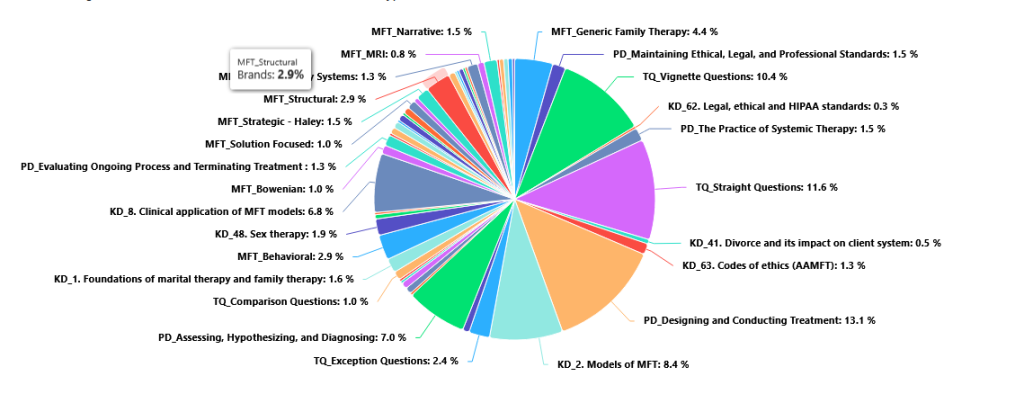Why Practice Tests Are the Secret Weapon for Passing the AMFTRB Exam
Practice Makes Perfect: Why Practice Tests Are Your Key to Exam Success
Preparing for the AMFTRB (Association of Marital and Family Therapy Regulatory Boards) exam can feel like navigating a maze. Between the vast array of content — family systems theories, clinical interventions, ethics, and research — and the high stakes of licensing, it’s easy for students to feel overwhelmed. Many aspiring therapists invest hours reading textbooks, reviewing lecture notes, and trying to memorize the content, but there’s one tool that consistently separates those who pass confidently from those who struggle: practice tests.
Why Practice Tests Are More Than Just “Extra Work”
You might think, “I’ve read the Big Green Book five times, why do I need a practice test?” While reading and reviewing are essential, it doesn’t always translate to knowing what you actually understand. Practice tests do more than measure knowledge — they train your brain to think like the exam.
While being tested on your ability to think “systemically” to do so on the AMFTRB exam will not always lead you to a correct choice. To pass this exam, you will need to shift back to thinking linearly on systemic thinking. FSI’s Practice Exams will show you how to accomplish this.
Here’s why practice tests are a true game-changer:
1. Identify Knowledge Gaps Quickly
One of the biggest challenges in studying is not knowing what you don’t know. Reading a chapter or taking notes can create a false sense of confidence. Practice tests, however, expose gaps in understanding almost immediately. When you answer questions and check your results, you can pinpoint exactly which concepts need more attention — whether it’s family systems assessment, ethical guidelines, or intervention strategies.
This targeted approach is far more efficient than reading through all the material repeatedly. It ensures that your study time is strategic and focused, reducing wasted effort and maximizing results.
2. Build Exam Confidence
Confidence is often underestimated in test preparation. Anxiety can affect focus, recall, and performance on the day of the exam. By taking regular practice tests, students develop familiarity with the structure, format, and timing of the AMFTRB exam. They become comfortable with the way questions are phrased, recognize common distractors, and feel less intimidated by the exam environment.
Confidence is not just a mental state — it’s a measurable advantage. Students who regularly use practice tests enter the exam room with a sense of readiness and calm that can make all the difference.

3. Improve Recall Under Pressure
The AMFTRB exam is timed, and it requires more than just knowledge — it requires the ability to apply that knowledge quickly and accurately. Timed practice tests train your brain to retrieve information under realistic conditions. Over time, the repeated retrieval practice strengthens memory and recall, helping you answer questions efficiently during the actual exam.
This isn’t just theory — studies show that the act of recalling information repeatedly is one of the most effective ways to cement knowledge in long-term memory. The more you practice in exam-like conditions, the better you perform under pressure.
5. FSI’s Unique Approach to Practice Exams
At Family Solutions Institute, we take practice tests to the next level. Unlike generic test prep, FSI offers Practice Exams designed specifically for the AMFTRB exam, complete with incredible Personalized Progress Reports that give students a detailed breakdown of strengths and weaknesses. These reports are only available through FSI and provide actionable insights to refine study strategies.
Our system doesn’t just tell you if an answer is right or wrong — it shows patterns over time, highlights areas needing more focus, and tracks improvement so you can see real progress. It’s this combination of precision and feedback that makes FSI’s Practice Exams a true secret weapon.
4. Develop Strategic Thinking
Passing the AMFTRB exam is not just about knowing content — it’s about thinking critically and strategically. Practice tests teach students how to approach questions thoughtfully: which answers are likely correct, which are distractors, and when to make an educated guess. They also help students learn pacing, ensuring enough time to answer every question carefully without rushing.
6. Proven Success Rates
FSI’s methods are not theoretical — they work. Family Solutions Institute has helped over 110,000 candidates pass the AMFTRB National Licensing Exam, and over 80% of our students pass on their first attempt when using FSI’s Intensive Home and eStudy Programs (or the combined Home & eStudy track — the most comprehensive course and the best deal, price-wise). These results demonstrate that a structured, feedback-oriented approach to practice testing is incredibly effective.
An example of FSI’s Personalized Progress Report – unique on the market

7. Tips for Maximizing the Benefits of Practice Tests
Conclusion: Practice Tests Are More Than a Study Tool
In the journey to passing the AMFTRB exam, knowledge alone is not enough. It’s application, strategy, and confidence that separate first-time passers from repeat test-takers. Practice tests provide all three. They identify gaps, strengthen memory, build confidence, and teach the strategic thinking necessary to excel.
At Family Solutions Institute, we’ve refined this process over decades, helping thousands of students succeed. Our Practice Exams, combined with expert guidance and progress tracking, give students the tools they need to approach the AMFTRB exam with clarity, confidence, and control.
If you’re preparing for your AMFTRB exam, don’t just study — practice with purpose. With the right tools and strategies, you can turn preparation into success, just like the tens of thousands of students who have passed before you.

